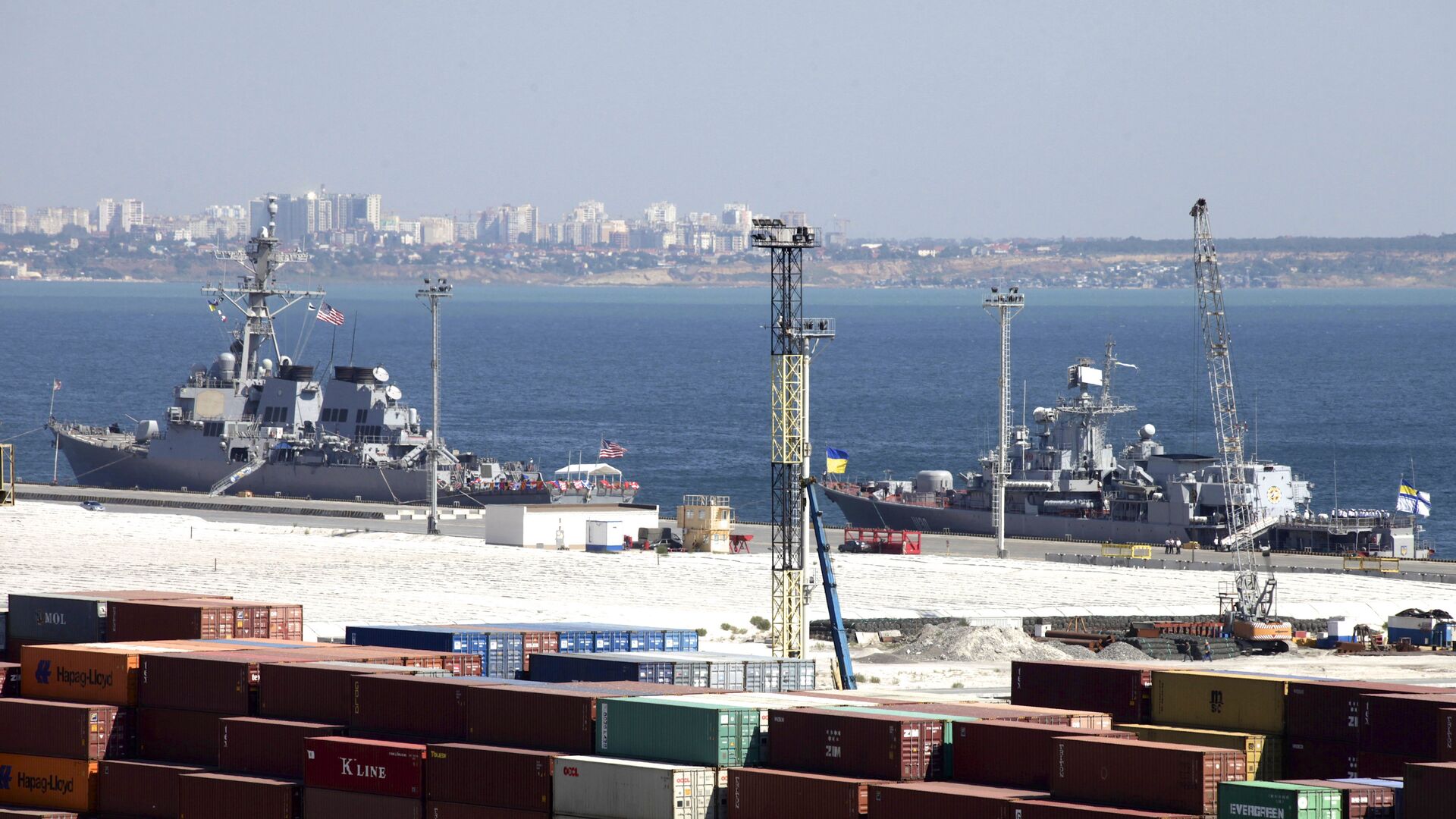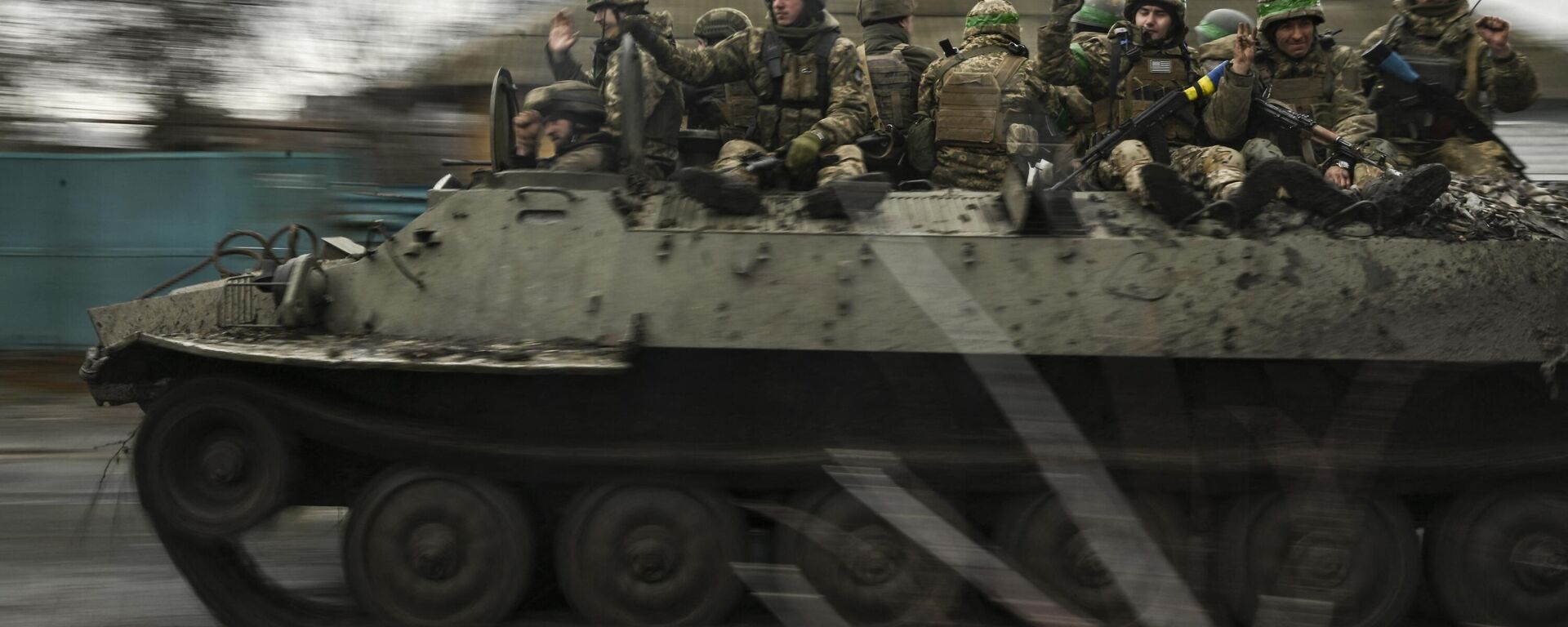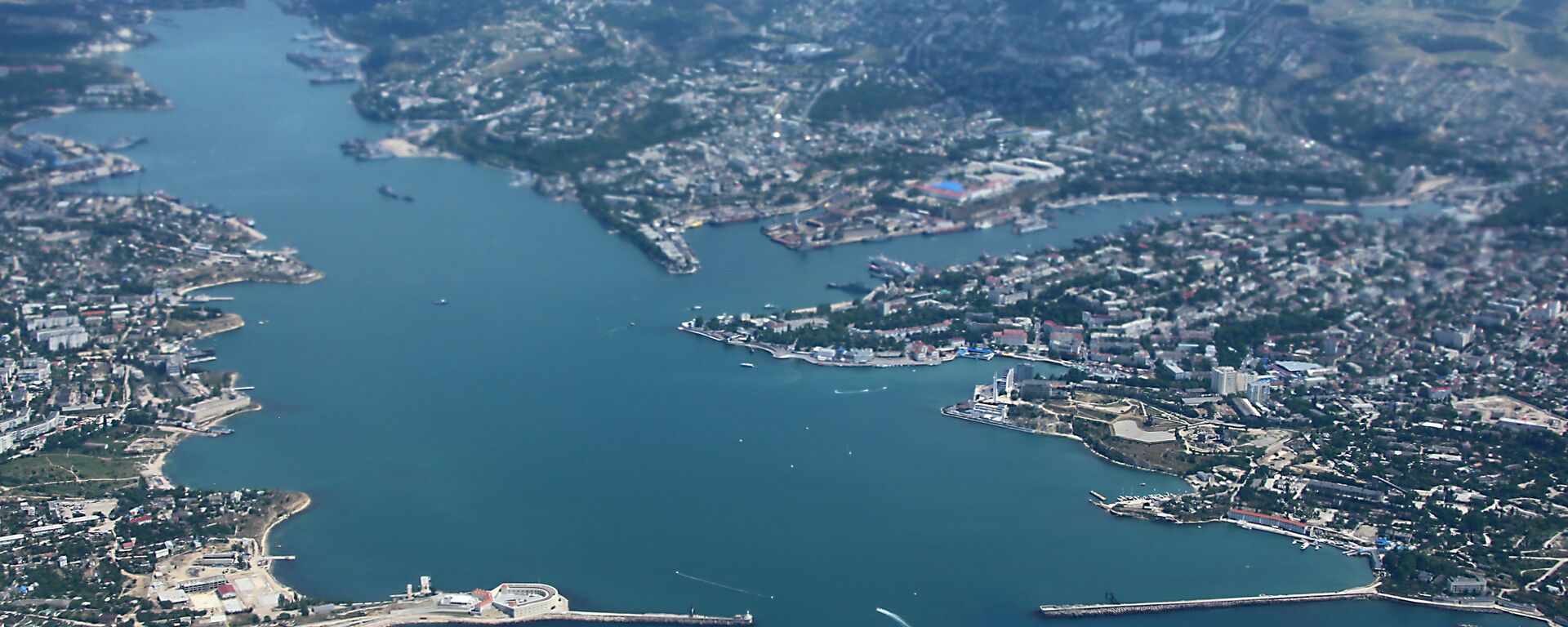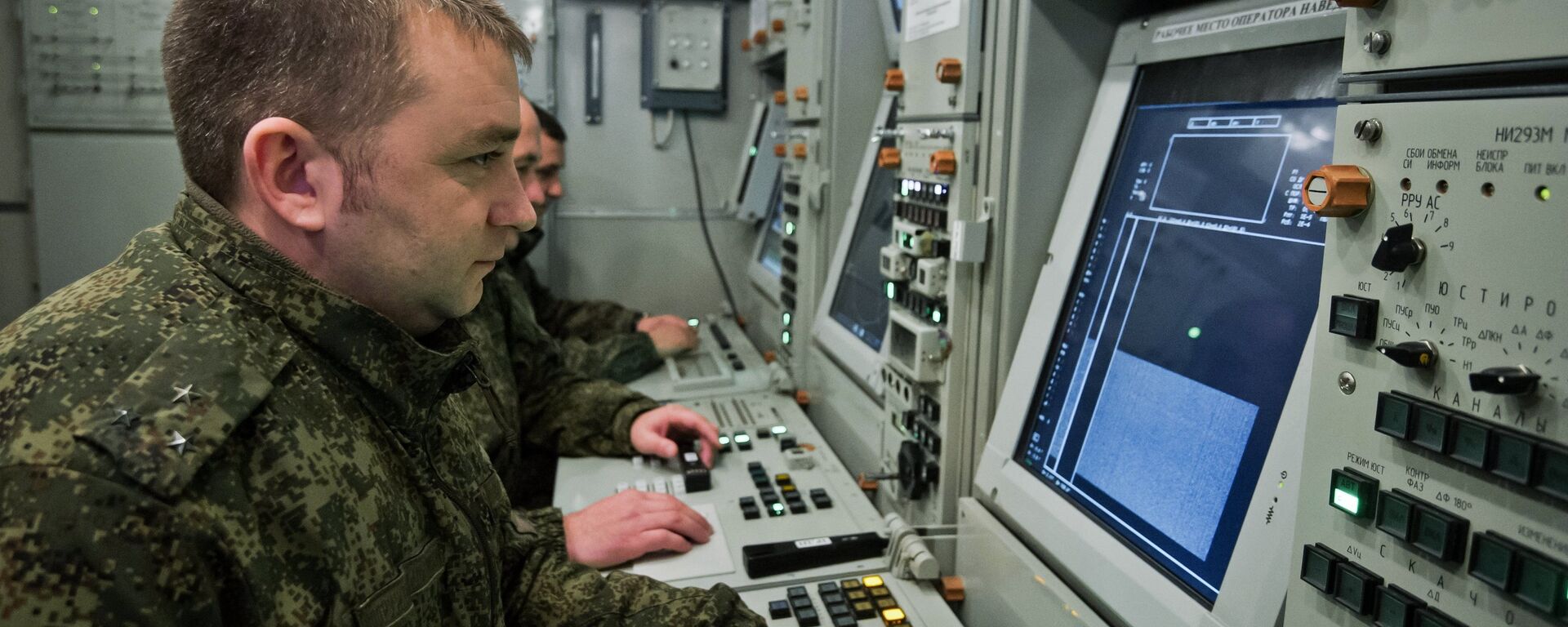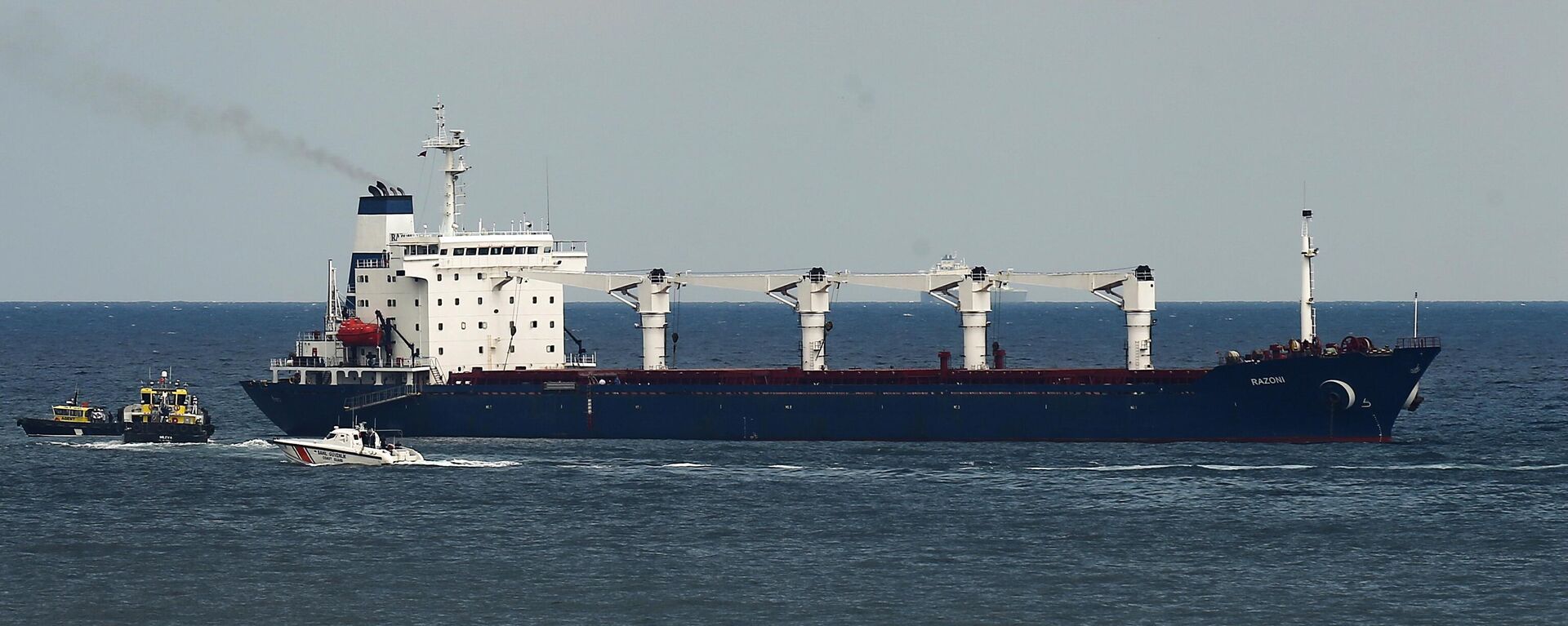https://sputnikglobe.com/20230426/nato-could-send-troops-to-western-ukraine-if-kievs-spring-offensive-fails---heres-why-1109858694.html
NATO Could Send Troops to Western Ukraine if Kiev’s Spring Offensive Fails - Here's Why
NATO Could Send Troops to Western Ukraine if Kiev’s Spring Offensive Fails - Here's Why
Sputnik International
Mainstream reporting related to the so-called ‘Pentagon leaks’ about the DoD’s sobering assessment of the real state of the NATO-Russia proxy conflict in Ukraine has brought the ‘do or die’ pressure facing Kiev into focus. Without a decisive victory, Kiev may be pushed into ceasefire talks, says international affairs expert Mark Sleboda.
2023-04-26T17:04+0000
2023-04-26T17:04+0000
2024-06-23T18:32+0000
analysis
ukraine
odessa
donbass
us
nato
russia
offensive
army offensive
ground offensive
https://cdn1.img.sputnikglobe.com/img/104294/31/1042943100_78:0:5324:2951_1920x0_80_0_0_21863528695d190264cf100ef937f2da.jpg
Anonymous Biden administration officials told US media this week that the White House is “quietly preparing” for the contingency of Ukrainian forces failing to gain any significant ground against Russia during Kiev’s much-hyped spring offensive, and for the reputational blow this might have for Washington via-a-vis other allies and clients. Administration officials reportedly also fear that a failed or stalled offensive could result in attacks on the White House at home both by hawks pushing for even more aid to Kiev, and doves arguing that the Ukrainian Army’s failure would prove that Russia can’t be ejected from Crimea, Donbass, and its new territories.Officials are reportedly mulling pushing Zelensky into a “ceasefire” to enable Kiev to retool and reequip for a resumption of the conflict at a later date, with measures meant to prod the Zelensky government into accepting including "NATO-like security guarantees," EU economic support, and more military aid.“I think this is actually one in a series of articles that have come out in the last few weeks, including the so-called ‘Pentagon Leaks’ which I think most Russian analysts believe are just another narrative management tool,” Mark Sleboda said, speaking to Radio Sputnik’s The Final Countdown radio show on Tuesday.The latest piece in the MSM hyping the prospects of a possible Ukrainian defeat isn’t the first, Sleboda recalled, pointing to another recent legacy media piece from last week warning that a “breakthrough” in the conflict may not come at all in 2023, and that observers should lower their expectations of Ukraine advancing more than 30 km.Characterizing the expected Ukrainian offensive as “the most telegraphed offensive in history,” Sleboda said that naturally, reality “cannot possibly” live up to the hype as far as objectives are concerned.“And again, the mainstream media, The Washington Post, The New York Times have done features about how Russia has been, for the last half year, building up extensive layered trench networks, fortified concrete fortifications, pillboxes, tank obstacles like dragon teeth, etc., and very extensive minefields laid out in advance…We have seen the Kiev regime go on the offensive before against Russian troops that weren’t even half as well dug-in in Kherson. And it’s now acknowledged that Russian forces withdrew, but without taking any significant casualties. They withdrew tactically to avoid being enveloped, but they inflicted crippling casualties because the Ukrainian forces were charging across open steppe into superior artillery, rocket systems, and air dominance,” the analyst said.Russia could afford to give up territory in the past because they’re “fighting a different type of conflict,” according to Sleboda, prioritizing force preservation and attrition warfare meant to “grind down the Kiev regime’s military and now effectively NATO as well, because NATO is 100% supplying the regime at this point.”‘Talking Smack About Crimea’Among Kiev’s formal priorities is a long-promised attack on Crimea. That’s a fantasy, Sleboda believes, since even without a Kherson-Zaporozhye "land bridge" linking Crimea to the Russian mainland, the peninsula is just too tough a nut to crack.“Of course, they talk a lot of smack about Crimea, which is ridiculous, because Crimea is a peninsula, geographically a very difficult target to attack, very heavily defended with a 95% pro-Russian population. It’s ridiculous,” the observer stressed. The reality, he added, is that even officials like Joint Chiefs Chairman Mark Milley have recognized that Kiev has no chance of “retaking” the peninsula.Sleboda pointed to the Times’ admission that the 12 new Ukrainian combat brigades of 4,000 troops apiece formed for the spring offensive – which are expected to be ready by the end of the month, are “raw recruits with a small core of experienced veteran soldiers,” and that they are equipped with handfuls of more modern NATO tanks and armored vehicles accompanied by much older equipment, and facing a big disadvantage in artillery and control of airspace.Even the debate over deliveries of the much-vaunted F-16 fighters to Kiev is “all political,” according to the observer, because it takes years to train to use them, and Washington may prefer to save them, along with the ATACMS missiles long demanded by Kiev, for a possible war against China in the Pacific.‘New Domino Theory’ and Danger of WWIIIPointing to the “new domino theory” that’s being pushed by neocons and neoliberals in Washington on the need to prop up Kiev at all costs, or face Taiwan “falling” to China, Sleboda fears that if push comes to shove and Kiev suffers a major defeat on the battlefield, NATO may be tempted to intervene directly in the crisis to prevent its global defeat.“I believe that if the Kiev regime suffers a catastrophic defeat and NATO can’t filter more weapons useful to them through them, they might consider what I’ve talked about for maybe half a year now – sending US and Polish troops, maybe Romanians, the Baltics, the Brits – a new ‘coalition of the willing’ as ‘peacekeepers’ into western Ukraine. To tell you the truth Russia would probably yell and scream, but they don’t really want to occupy West Ukraine because unlike East Ukraine, they really do hate Russia over there. It would be very hostile guerilla territory. That’s the part of Ukraine that sided with Nazi Germany in World War II and is resurrecting all of that type of anti-Russian, Banderite fascist glorification today,” Sleboda said.If you want to learn more about Mark Sleboda's thoughts on why the Biden administration believes the US-led Western global hegemonic order may be at stake in Ukraine, check out our Telegram post here.
https://sputnikglobe.com/20230422/lack-of-arms-start-of-ukraines-counteroffensive-reportedly-postponed-indefinitely-1109753863.html
https://sputnikglobe.com/20230407/us-congressman-ukrainian-spring-offensive-to-show-whether-crimea-off-table-for-kiev--1109247941.html
https://sputnikglobe.com/20230408/russian-air-defense-shoots-down-ukrainian-missile-over-crimea-1109266987.html
https://sputnikglobe.com/20230424/kievs-recent-strikes-on-humanitarian-corridor-threaten-extension-of-grain-initiative---moscow-1109804952.html
ukraine
odessa
donbass
russia
crimea
Sputnik International
feedback@sputniknews.com
+74956456601
MIA „Rossiya Segodnya“
2023
News
en_EN
Sputnik International
feedback@sputniknews.com
+74956456601
MIA „Rossiya Segodnya“
Sputnik International
feedback@sputniknews.com
+74956456601
MIA „Rossiya Segodnya“
ukraine, ukrainian crisis, russia, united states, us, proxy conflict, proxy war, odessa, donbass, crimea, kherson, zaporozhye
ukraine, ukrainian crisis, russia, united states, us, proxy conflict, proxy war, odessa, donbass, crimea, kherson, zaporozhye
NATO Could Send Troops to Western Ukraine if Kiev’s Spring Offensive Fails - Here's Why
17:04 GMT 26.04.2023 (Updated: 18:32 GMT 23.06.2024) Mainstream reporting related to the so-called “Pentagon leaks” about the DoD’s sobering assessment of the real state of the NATO-Russia proxy conflict in Ukraine has brought the “do or die” pressure facing Kiev into focus. Without a decisive victory, Kiev may be pushed into ceasefire talks, says international affairs expert Mark Sleboda.
Anonymous Biden administration officials told US media this week that the White House is
“quietly preparing” for the contingency of Ukrainian forces failing to gain any significant ground against Russia during Kiev’s much-hyped spring offensive, and for the reputational blow this might have for Washington via-a-vis other allies and clients. Administration officials reportedly also fear that a failed or stalled offensive could result in attacks on the White House at home both by hawks pushing for even more aid to Kiev, and doves arguing that the Ukrainian Army’s failure would prove that Russia can’t be ejected from Crimea, Donbass, and its new territories.
Officials are reportedly mulling pushing Zelensky into a “ceasefire” to enable Kiev to retool and reequip for a resumption of the conflict at a later date, with measures meant to prod the Zelensky government into accepting including "NATO-like security guarantees," EU economic support, and more military aid.
“I think this is actually one in a series of articles that have come out in the last few weeks, including the so-called ‘Pentagon Leaks’ which I think most Russian analysts believe are just another narrative management tool,” Mark Sleboda
said, speaking to Radio Sputnik’s The Final Countdown radio show on Tuesday.
The latest piece in the MSM hyping the prospects of a possible Ukrainian defeat isn’t the first, Sleboda recalled, pointing to another recent legacy media piece from last week
warning that a “breakthrough” in the conflict may not come at all in 2023, and that observers should lower their expectations of Ukraine advancing more than 30 km.
“So [there’s a] lowering [of] expectations, lowering the bar for success. Now we have twin articles coming out of Politico, but also The New York Times coming out within 24 hours of each other. And the Times tells us that ‘Ukraine’s spring offensive comes with immense stakes for future of the war’ and that without a decisive victory, Western support for Ukraine could weaken and Kiev could come under increasing pressure to enter serious peace talks to end or freeze the conflict,” the observer noted.
Characterizing the expected Ukrainian offensive as “the most telegraphed offensive in history,” Sleboda said that naturally, reality “cannot possibly” live up to the hype as far as objectives are concerned.
“And again, the mainstream media, The Washington Post, The New York Times have done features about how Russia has been, for the last half year, building up extensive layered trench networks, fortified concrete fortifications, pillboxes, tank obstacles like dragon teeth, etc., and very extensive minefields laid out in advance…We have seen the Kiev regime go on the offensive before against Russian troops that weren’t even half as well dug-in in Kherson. And it’s now acknowledged that Russian forces withdrew, but without taking any significant casualties. They withdrew tactically to avoid being enveloped, but they inflicted crippling casualties because the Ukrainian forces were charging across open steppe into superior artillery, rocket systems, and air dominance,” the analyst said.
Russia could afford to give up territory in the past because they’re “fighting a different type of conflict,” according to Sleboda, prioritizing force preservation and attrition warfare meant to “grind down the Kiev regime’s military and now effectively NATO as well, because NATO is 100% supplying the regime at this point.”
‘Talking Smack About Crimea’
Among Kiev’s formal priorities is a long-promised attack on Crimea. That’s a fantasy, Sleboda believes, since even without a Kherson-Zaporozhye "land bridge" linking Crimea to the Russian mainland, the peninsula is just too tough a nut to crack.
“Of course, they talk a lot of smack about Crimea, which is ridiculous, because Crimea is a peninsula, geographically a very difficult target to attack, very heavily defended with a 95% pro-Russian population. It’s ridiculous,” the observer stressed. The reality, he added, is that even officials like Joint Chiefs Chairman Mark Milley have recognized that Kiev has no chance of “retaking” the peninsula.
“It’s perfectly obvious from the articles being put out today that now they don’t believe they could even get to that administrative border, nowhere close to it. I don’t believe so either. They may push Russian forces back a bit. But they talked about it in The New York Times back in December even, that the Biden administration, speaking through their stenographers anonymously, said ‘we don’t think that they can take Crimea, but we need to have the Russians believe Crimea is under threat to improve the Kiev regime’s negotiating position in future negotiations.’ They think they can get Russia to withdraw from Kherson and Zaporozhye and be satisfied with just the Donbass and Crimea. That’s their thinking. That’s why they don’t consider Bakhmut strategic, unlike Zelensky, who is trying to hold on to it all, because the US has written the Donbass off. They know that it’s an overwhelmingly pro-Russian area, that Russia has invested an enormous amount of political capital with the referendums there, but they think they can still get them to give up on Kherson and Zaporozhye, which also held referendums, by the way,” Sleboda said.
Sleboda pointed to the Times’ admission that the 12 new Ukrainian combat brigades of 4,000 troops apiece formed for the spring offensive – which are expected to be ready by the end of the month, are “raw recruits with a small core of experienced veteran soldiers,” and that they are equipped with handfuls of more modern NATO tanks and armored vehicles accompanied by much older equipment, and facing a big disadvantage in artillery and control of airspace.
Even the debate over deliveries of the much-vaunted F-16 fighters to Kiev is “all political,” according to the observer, because it takes years to train to use them, and Washington may prefer to save them, along with the ATACMS missiles long demanded by Kiev, for a possible war against China in the Pacific.
‘New Domino Theory’ and Danger of WWIII
Pointing to the “new domino theory” that’s being pushed by neocons and neoliberals in Washington on the need to prop up Kiev at all costs, or face Taiwan “falling” to China, Sleboda fears that if push comes to shove and Kiev suffers a major defeat on the battlefield, NATO may be tempted to intervene directly in the crisis to prevent its global defeat.
“I believe that if the Kiev regime suffers a catastrophic defeat and NATO can’t filter more weapons useful to them through them, they might consider what I’ve talked about for maybe half a year now – sending US and Polish troops, maybe Romanians, the Baltics, the Brits – a new ‘coalition of the willing’ as ‘peacekeepers’ into western Ukraine. To tell you the truth Russia would probably yell and scream, but they don’t really want to occupy West Ukraine because unlike East Ukraine, they really do hate Russia over there. It would be very hostile guerilla territory. That’s the part of Ukraine that sided with Nazi Germany in World War II and is resurrecting all of that type of anti-Russian, Banderite fascist glorification today,” Sleboda said.
Ultimately, the main issue of concern for the analyst is Odessa – the strategic, majority Russian-speaking seaport. “If the Kiev regime loses that, then they’re a landlocked little rump state, and the US [has] got the 101st Airborne just across the border in Romania exactly to step across as a tripwire force into Odessa. And that’s the scenario that keeps me up at night. That’s the World War III scenario, as far as I’m concerned [it] is a possible direct NATO-Russia fight over Odessa because I do not believe for a second that Russia would allow Odessa to become a US naval base,” Sleboda summed up.
If you want to learn more about Mark Sleboda's thoughts on why the Biden administration believes the US-led Western global hegemonic order may be at stake in Ukraine, check out our Telegram post
here.
